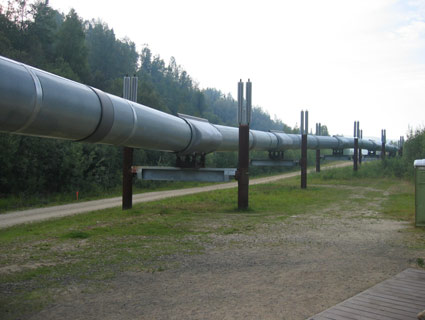What do the infamous Koch brothers have to do with the controversial Keystone XL pipeline, which, if approved, would run 1,661 miles from Alberta, Canada to Texas, carrying 900,000 barrels of oil from Canada’s tar sands to US refineries? TransCanada has requested permission to build the pipeline, but Reps. Henry Waxman (D-Calif.) and Bobby Rush (D-Ill.) want more information about how project might also benefit the right-wing financiers and their energy conglomerate, Koch Industries. The pair sent a letter ot Republican leadership on the House Energy and Commerce Committee asking them to formally request more information. This comes in response to an article from SolveClimate that indicated that the Kochs could profit big time if the pipeline is approved.
The lawmakers wrote:
Publicly available information indicates that the company is involved in several aspects of Canadian tar sands development. Koch’s Pine Bend Refinery in Minnesota currently processes roughly 25% of the tar sands fuel imports to the United States. Koch owns Flint Hills Resources, LLP, in Calgary, Canada, which is “among Canada’s largest crude oil purchasers, shippers and exporters.” Flint Hills Resources also operates a crude oil terminal in Hardisty, Alberta, where the Keystone XL pipeline will begin. According to the Government of Alberta, Koch Industries has both proposed and producing tar sands projects in the province. The Oil Sands Developers Group also indicates that Koch is a tar sands project developer. Koch’s Corpus Christi refinery is positioned near the end of the proposed Keystone XL pipeline and would be a potential buyer for the tar sands crude shipped through the pipeline.
When Democratic staff for the Energy and Commerce Committee recently inquired about Koch Industries’ connections to the proposed pipeline, however, the company’s representatives told them the firm has “no financial interest” in the project. Waxman and Rush want the committee’s Republican leadership to formally ask the company to provide any and all documents relating to the pipeline.
This comes as House Republicans attempt to advance a bill that would expedite the review process for the pipeline, forcing President Obama to make a decision by November 1, 2011. (The text of the bill makes it pretty clear that its authors want that answer to be a “yes.”) The House energy and commerce committee is holding a hearing on the legislation today, where TransCanada’s president, Alex Pourbaix, will testify.
The State Department recently granted more time for evaluation of the pipeline, as environmental groups, farmers and lawmakers from the region have expressed concerns about its potential environmental impacts. Those fears are justified; TransCanada’s current pipeline has been plagued by leaks.
Republicans on the committee and Koch Industries have counter-attacked, with one Republican staffer calling Waxman’s request a “transparently political stunt” in a comment to The Hill. Of course, it’s no secret that drawing a Kochtopus connection is an easy way to draw attention to a subject. But it shouldn’t distract from the many substantial concerns about the pipeline proposal with or without their involvement.








